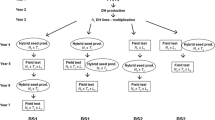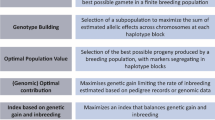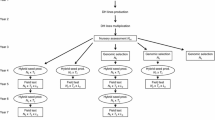Abstract
Key message
The predicted future yield potential of hybrids was competitive with lines in the near future, but on a long term the competitiveness of hybrids depends on a number of factors.
Abstract
The change from line to hybrid breeding in autogamous crops is a recent controversial discussion among scientists and breeders. Our objectives were to employ wheat as a model to: (1) deliver a theoretical framework for the comparison of the selection gain of hybrid versus line breeding; (2) elaborate key parameters affecting selection gain in this comparison; (3) and evaluate the potential to modify these parameters in applied breeding programs. We developed a prediction model for future yield potential in both breeding methods as the sum of the population mean and the expected selection gain. The expected selection gain was smaller in hybrid than in line breeding and depended strongly on the hybrid seed production costs and the genetic variance available in hybrid versus line breeding. Owing to heterosis, the predicted future yield potential of hybrids was competitive with lines in the near future. On a long term, however, the competitiveness of hybrid compared to line breeding is questionable and depends on a number of factors. However, market specifications and political reasons might justify the current high interest in hybrid wheat breeding.


Similar content being viewed by others
References
Becker H (1993) Pflanzenzüchtung (in German). Verlag Eugen Ulmer, Stuttgart, pp 129–132
Bernardo R (2002) Breeding for quantitative traits in plants. Stemma Press, Woodbury, pp 110–120
Cochran WG (1951) Improvement by means of selection. In: Proceedings of 2nd Berkeley symposium mathematical statistics and probability, pp 449–470
Duvick DN, Smith JSC, Cooper M (2004) Long-term selection in a commercial hybrid maize breeding program. In: Janick J (ed) Plant breeding reviews, vol 24, part 2. Long term selection: crops, animals, and bacteria. Wiley, New York, pp 109–151
Edwards IB (2001) Origin of cultivated wheat. In: Bonjean AP, Angus WJ (eds) The world wheat book-a history of wheat breeding, vol 1. Lavoisier Publishing, Paris, pp 1019–1045
Gowda M, Longin CFH, Lein V, Reif JC (2012) Relevance of specific versus general combining ability in winter wheat. Crop Sci 52:2494–2500
Gowda M, Zhao Y, Würschum T, Longin CFH, Miedaner T, Ebmeyer E, Schachschneider R, Kazman E, Schacht J, Martinant JP, Mette MF, Reif JC (2013) Relatedness severely impacts accuracy of marker-assisted selection for disease resistance in hybrid wheat. Heredity 2013:1–10. doi:10.1038/hdy.2013.139
Hallauer AR, Russell WA, Lamkey KR (1988) Corn breeding. In: Sprague GF, Dudley JW (eds) Corn and corn improvement, 3rd edn. AgronMonogr18 ASA, CSSA, SSSA, Madison, pp 469–565
Kempe K, Gils M (2011) Pollination control technologies for hybrid breeding. Mol. Breed 27:417–437
Langer S, Longin CFH, Würschum T (2014) Phenotypic evaluation of floral traits with relevance for hybrid breeding in wheat (Triticum aestivum L.). Plant Breed. doi:10.111/pbr12192
Longin CFH, Utz HF, Reif JC, Schipprack W, Melchinger AE (2006) Hybrid maize breeding with doubled haploids. I. One-stage versus two-stage selection for testcross performance. Theor Appl Genet 112:903–912
Longin CFH, Utz HF, Melchinger AE, Reif JC (2007) Hybrid maize breeding with doubled haploids. II. Optimum type and number of testers in two-stage selection for general combining ability. Theor Appl Genet 114:393–402
Longin CFH, Mühleisen J, Maurer HP, Zhang H, Gowda M, Reif JC (2012) Hybrid breeding in autogamous cereals. Theor Appl Genet 125:1087–1096
Longin CFH, Gowda M, Mühleisen J, Ebmeyer E, Kazman E, Schachschneider R, Schacht J, Zhao Y, Reif JC (2013) Hybrid breeding in wheat: heterosis, relevance of general and specific combining ability effects and consequences for optimum breeding strategies. Theor Appl Genet 126:2791–2801
Miedaner T, Zhao Y, Gowda M, Longin CFH, Korzun V, Ebmeyer E, Kazman E, Reif JC (2013) Genetic architecture of resistance to Septoria tritici blotch in European wheat. BMC Genomics 14:858
Mühleisen J, Maurer HP, Stiewe G, Bury P, Reif JC (2013) Hybrid breeding in barley. Crop Sci 53(3):819–824
Oettler G, Tams SH, Utz HF, Bauer E, Melchinger AE (2005) Prospects for hybrid breeding in winter triticale: I. Heterosis and combining ability for agronomic traits in European elite germplasm. Crop Sci 45:1476–1482
R Development Core Team (2011) R: a language and environment for statistical computing. R Foundation for Statistical Computing, Vienna. http://www.r-project.org
Schnell FW, Utz HF(1975) F1-Leistung und Elternwahl in der Züchtung von Selbstbefruchtern (In German). In: Bericht über die Arbeitstagung der Vereinigung österreichischer Pflanzenzüchter. BAL Gumpenstein, Gumpenstein, Austria, pp 243–248
Shull GH (1908) The composition of a field of maize. Am Breed Assoc Rep 4:296–301
Zhao Y, Mette MF, Gowda M, Longin CFH, Reif JC (2014) Bridging the gap between marker-assisted and genomic selection of heading time and plant height in hybrid wheat. Heredity 2014:1–8. doi:10.1038/hdy.2014.1
Acknowledgments
We acknowledge the financial support by BMBF within the HYWHEAT project (Grant ID FKZ0315945D). We are grateful to the fruitful discussions with Prof. Dr. Geiger, Prof. Dr. Melchinger and Prof. Dr. Utz on the models used in this study.
Conflict of interest
The authors declare that they have no conflict of interest.
Ethical standard
The authors declare that the experiments comply with the current laws of Germany.
Author information
Authors and Affiliations
Corresponding author
Additional information
Communicated by Mark E. Sorrells.
Rights and permissions
About this article
Cite this article
Longin, C.F.H., Reif, J.C. & Würschum, T. Long-term perspective of hybrid versus line breeding in wheat based on quantitative genetic theory. Theor Appl Genet 127, 1635–1641 (2014). https://doi.org/10.1007/s00122-014-2325-8
Received:
Accepted:
Published:
Issue Date:
DOI: https://doi.org/10.1007/s00122-014-2325-8




